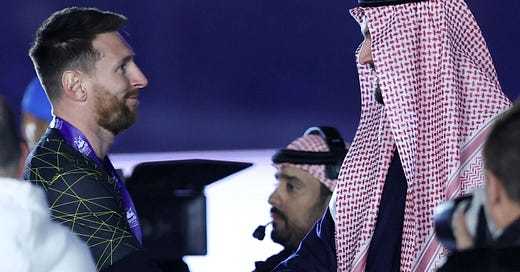The Price of Silence
Documents released by the U.S. Senate committee investigating the PGA-LIV Golf merger reveals how Saudi Arabia buys silence in the sports world.
On Tuesday, the U.S. Senate Permanent Subcommittee on Investigations held a hearing with PGA Tour representatives to discuss the PGA Tour’s framework agreement with Saudi Arabia’s Public Investment Fund (PIF) and how it would affect the future of golf.
Among the topics discussed was a non-disparagement clause tucked within the framework agreement that could be interpreted as an attempt to prevent the PGA Tour, and its players by extension, from saying anything critical of Saudi Arabia.
I had a chance to review the documents released by the Senate committee, including the framework agreement and its subsequent revisions. The clause, which was added to the third revision of the agreement, states the following:
Each party agrees and covenants that it will not at any time, directly or indirectly, make, publish or communicate to any person or entity or in any public forum any defamatory or disparaging remarks, comments, or statements concerning the other Party, their affiliates and ultimate beneficial owners or their respective businesses, directors, employees, officers, shareholders, members or advisors.
Though vague, the clause sheds light on the legal tactics employed by the kingdom to muzzle potential critics. Sen. Richard Blumenthal, chair of the committee, shared his concerns regarding the clause during the hearing, stating during his opening remarks that “we also don’t know what will happen to players who may want to speak out against Saudi Arabia’s human-rights abuses; they apparently are bound by the non-disparagement clause.”
In response to Sen. Blumenthal’s concerns, PGA Tour COO Ron Price and policy board member Jimmy Dunne, who represented the tour during the hearing, suggested that such clauses were common practice during business negotiations and were unlikely to make the final cut.
"We will protect our players proudly," Price replied. "Our players will be freely able to speak about Saudi Arabia.”
While Price’s answer sounds definitive, the kingdom has a history of restrictive contracts.
In a story co-authored with Tariq Panja for The New York Times last month, I revealed the details of Lionel’s Messi’s ongoing partnership with Saudi Arabia’s tourism authority. His contract included a clause stating that Messi could not say anything that may “tarnish” Saudi Arabia, a country with an atrocious human rights record.
What was the price of Messi’s silence, you ask? Approximately $25 million.
PIF, the sovereign wealth fund chaired by the kingdom’s de facto ruler Mohammed Bin Salman, also financed the purchase of Newcastle United, a football team in the English Premier League and helped bring about the capitulation of a major U.S. sports organization through its hostile takeover of the PGA Tour. PIF also acquired majority stakes in the Saudi Pro League’s top four clubs—Al-Ahli, Al-Ittihad, Al-Hilal, and Al-Nassr—in an attempt to turn the country’s domestic league into a hotbed for global talent. The clubs, in turn, have since seduced some of the world’s top players to join their teams with extraordinary deals that could be worth more than $1 billion in wages for 20 foreign players.
Among the kingdom’s major signings for its domestic league was Cristiano Ronaldo, who signed a $200 million-per-year deal with Al Nassr. Former Real Madrid striker and current Ballon d’Or winner Karim Benzem joined Jeddah’s Al Ittihad in a deal worth more than $200 million for two-and-a-half years. Others such as French superstar N’Golo Kante, signed deals worth more than $100 million. Given the king’s ransom on offer for these international footballers to come live in the kingdom, it is likely that Saudi Arabia included some variation of a non-disparagement clause in their contracts.
So why is Saudi Arabia so interested in silencing sports leagues and athletes? The answer is simple: the kingdom wants to control the global narrative.
By luring some of the world’s top athletes and sports leagues, Saudi Arabia is announcing itself as an essential hub for sports, entertainment, and tourism. It is a soft power strategy that helps presents the kingdom as a reformed nation and appealing destination for individuals and businesses alike. However, this ambitious strategy is a double-edged sword: while athletes can use their platforms to promote Saudi Arabia, they can also use it to advance social issues or raise concerns about human rights abuses.
By eliminating the latter under threat of litigation, the kingdom can preemptively protect itself from potentially embarrassing situations counteractive to its political aims.
Saudi Arabia's utilization of non-disparagement clauses exposes a concerning trend regarding the kingdom’s relentless pursuit to control the narrative. By silencing critics and safeguarding its image, the kingdom's influence has the potential to reach far beyond the playing fields.
This is the true price of silence.
Sports Politika is a newsletter about the intersection of sports and politics. If you like what you see, upgrade to a paid subscription ( or gift a subscription if you already have your own). We would appreciate if you could also like the post and let us know what you think in the comment section below.







Excellent reporting, Karim—these NDAs are going to be trouble
Definitely underpaid all things considered